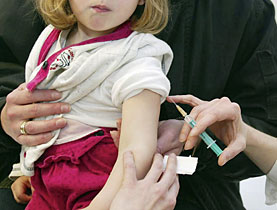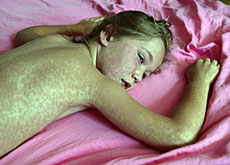Swiss respond to measles epidemic plea

The Swiss are heeding advice to increase vaccinations against measles to curtail a major epidemic underway in the country.
More vaccines have been sold since the government launched an appeal in March to raise the immunisation rate in Switzerland, the Federal Health Office said on Monday.
“I think people have got the message that they should be vaccinated,” Jean-Louis Zurcher from the health office told swissinfo.
He echoed concerns expressed by European experts that the Euro 2008 tournament, which is being co-hosted by Switzerland and Austria in June, could become a breeding ground for measles after major outbreaks in the two countries.
Switzerland is experiencing its worst measles epidemic since mandatory reporting of the disease in 1999 and is believed to be the source of two measles outbreaks in the United States.
Since the start of 2008, there have been 1,204 reported cases in Switzerland – compared with 151 over the same period last year and 21 in 2006. The epidemic has reached all parts of the country, with 133 sufferers treated in hospital.
The European Centre for Disease Prevention and Control (ECDPC) said hundreds of thousands of people, some of whom may be unvaccinated against measles, were expected to travel to Austria and Switzerland for the championship.
“Measles is one of the most contagious viruses in existence, causing serious illness and even death. If unvaccinated people are exposed to it, they have a high chance of being infected,” said director Zsuzsanna Jakab.
“Significant outbreaks have occurred recently in several European countries, so the risk to the millions of unvaccinated Europeans is real,” she said, adding that public health officials needed to act.
Experts from the ECDPC will meet in Austria ahead of Euro 2008 to assess the risks. They believe measles will spread particularly to regions where vaccination rates are low, such as Spain, Germany, Italy and Britain.
US cases
Earlier this month, the United States Center for Disease Prevention and Control identified two people from Switzerland as the source of outbreaks in California and Arizona.
There were 11 reported cases in San Diego at the start of 2008 after an unvaccinated child visited from Switzerland.
Another outbreak in Arizona has been linked to an adult visitor from Switzerland who was admitted to hospital with measles and pneumonia, prompting checks on the immune status of 1,800 healthcare workers and vaccinations. Nine confirmed cases were later reported, almost all of whom were infected in healthcare environments.
The Swiss Federal Health Office has recommended all visitors to Switzerland check their vaccination status and be immunised if they have not had the full course of the combined MMR vaccine which offers basic protection against measles, mumps and rubella.
Zurcher said the government advice was particularly important for people attending major events such as Euro 2008.
“We can’t do anything else but recommend that people coming from abroad are vaccinated for their own safety and the safety of their relatives,” he said.
“They will be going back to countries like the US or Finland where measles has been eliminated and there could be problems later.”
Cross-cantonal approach
To combat the problem in Switzerland, a joint appeal was issued in March by the health office, the conference of cantonal health directors and the association of cantonal doctors for doctors to check their patients’ records and offer vaccinations to adults born after 1963 who had not already had the virus.
To eliminate measles from the country, the current immunisation rate among young children will also need to be raised from the current 86 per cent to 95 per cent.
Zurcher said all Swiss cantons had adopted a “strong and active” approach to addressing the situation.
Hans Gerber from the association of cantonal doctors told swissinfo: “We hope that the attention given to this matter in Switzerland by the media and other parties will have an effect.”
swissinfo, Jessica Dacey
Measles is an acute viral illness, which is highly contagious. The first sign of infection is usually high fever; after several days a rash develops over the body.
The most serious complications include blindness, encephalitis, severe diarrhoea, ear infections and severe respiratory infections such as pneumonia.
As of 2001, the MMR1 (first dose) shot has been recommended in Switzerland at the age of 12 months and MMR2 at age 15-24 months. Catch-up vaccination with two doses of MMR is recommended at any time until the age of 40.
Routine childhood vaccination against measles was introduced in most European countries in the 1980s. The key risk group in Europe is children and young adults who have not had the opportunity to be vaccinated or have refused.
The outbreak in Switzerland began in November 2006 among school children in the canton of Lucerne. It then spread to all cantons, with large differences in incidence rates.
Cantons are responsible for outbreak control measures. The nature and intensity of the measures has varied between cantons.
Half of those affected were aged between five and 15. A total of 98 per cent of patients had either received just one of two necessary vaccinations or had not been vaccinated at all. It was usually spread in families and at schools.
The European Centre for Disease Prevention and Control estimates that up to three million people in Europe fall into the at-risk category.
The Federal Health Office, the conference of cantonal health directors and the association of cantonal doctors have issued a joint appeal to doctors to check their patients’ records and offer vaccinations to adults born after 1963 who have not already had the virus.
Young children are being vaccinated as part of regular immunisation programmes. Steps will also be taken to improve prevention such as excluding affected pupils from school and monitoring their family members.

In compliance with the JTI standards
More: SWI swissinfo.ch certified by the Journalism Trust Initiative


You can find an overview of ongoing debates with our journalists here. Please join us!
If you want to start a conversation about a topic raised in this article or want to report factual errors, email us at english@swissinfo.ch.